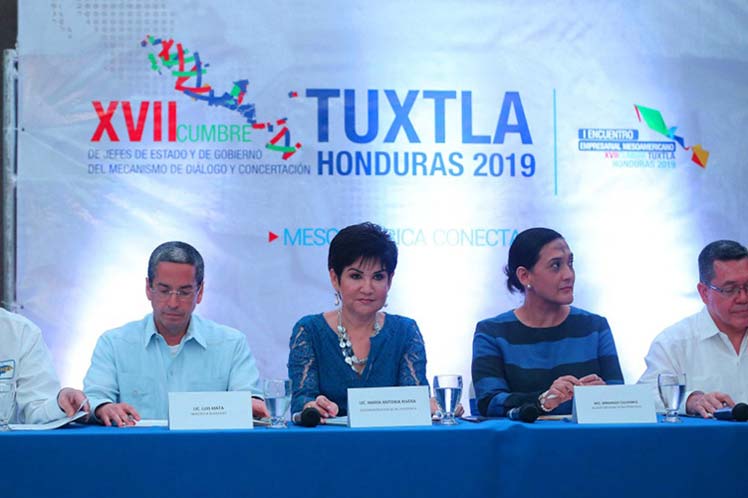by the El Reportero’s wire service
Honduras will host for the first time the Summit of Heads of State of the Tuxtla Dialogue and Concertation Mechanism, which will be attended by governors from the seven Central American countries, the Dominican Republic, Colombia and Mexico.
The event, to be held April 3-5 in San Pedro Sula, will focus its debates on four panels: Energy; Trade Facilitation and Treaties; Infrastructure and Logistics; and Strengthening MSMEs and Microcredits in the Region.
According to Maria Antonia Rivera, government official in charge of the summit’s development, this 17th edition is of special importance, as it will be held in parallel to the First Mesoamerican Business Meeting, which will bring together some 300 entrepreneurs from the region.
This cooperation, which arose as a result of fulfilling the mandates of previous editions, exceeds five billion dollars between 2008 and 2018, of which Honduras has benefited with more than one thousand 261 million dollars, in the construction of infrastructure works such as the highway between Tegucigalpa and El Amatillo.
‘We are one month away from the development of this great event. I ask Hondurans to be first line hosts, and the media to disseminate this great project that will be divided into two: the First Mesoamerican Business Meeting, and the (meeting) of the 10 governors of the region,’ Rivera said.
SICA Foreign Ministers Debate Region’s Future in Guatemala
Guatemala is hosting this Thursday a meeting of the Council of Ministers of Foreign Affairs of the Central American Integration System (SICA), with a view to regional integration.
Opening the meeting, Guatemalan Foreign Minister Sandra Jovel thanked her counterparts for attending this first high-level meeting as a preamble to the summit of Heads of State and Government in June.
We know that this dialogue will be very positive to strengthen the five pillars of Central American integration,’ said Jovel as he welcomed to Guatemala.
SICA’s Foreign Relations Officers will deal, according to the agenda, with regional integration, institutional strengthening of the organization and progress in the agreements adopted by the Central American Security Commission.
In addition, they will review migration, economic development and investment.
It is also expected that a memorandum of understanding will be approved for the establishment of the SICA Forum for Political Dialogue and Cooperation with the Republic of Turkey and the Kingdom of Morocco.
SICA was created on 12 December 1991 by Guatemala, El Salvador, Honduras, Nicaragua, Costa Rica and Panama.
Subsequently, Belize joined as full members in 2000 and, from 2013, the Dominican Republic.
Guatemala took over the pro tempore presidency of the organization from Belize last December and for six months.
This cooperation entity is headquartered in El Salvador.
Guatemalans vote focus on three women, according to poll
Three women are leading Thursday the Guatemalans” intention of vote, just 11 days before the start of the electoral campaign and amid accusations against candidates from the 27 parties involved in the contest.
If we look at the results of the most recent CID-Gallup poll, presidential candidate Sandra Torres, of the National Unity of Hope, would have the support of 17.7 percent of the population over 18 years old registered.
A little more than a thousand interviewees indicated in second place, with 10.7 percent, ex-prosecutor Thelma Aldana, who next Sunday will be officially proclaimed by the Seed Movement.
She would be followed by Zury Rios (7.9 percent), Alejandro Giammatei (5.80 percent), Edwin Escobar (3.1 percent) from the Prosperidad Ciudadana Party, and Roberto Arzu (2.8 percent) from the Alianza Podemos-Partido de Avanzada Nacional.
Mario Estrada, from the Union of National Change (2.7 percent); and Julio Hector Estrada, from Creo, (1.5 percent) are in the last places.
The statistics also show that 18 candidates did not exceed one percent, so they were included in the ‘other’ category.
It is also striking that 6.5 percent would not vote for anyone and another 34.4 percent do not know or did not respond, almost 50 percent.



